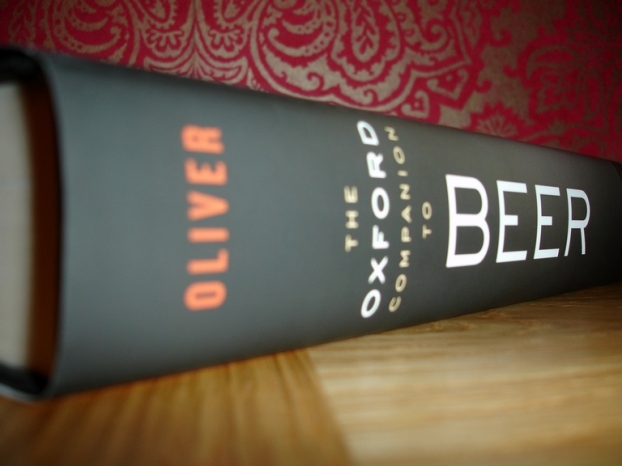Right, let’s see how many people I can offend (or possibly bore) in one post.
 The recent publication of the Oxford Companion to Beer has produced a flurry of negative comments in the online beer community. Ron Pattison has pulled apart the Scottish section, Martyn Cornell cautions it may be a ‘complete disaster’ and Andy Crouch is questioning whether beer writers should even be writing history at all. There’s even been a Wiki set up where people can lodge errors and omissions in the hopes of improving the second edition. If the blogosphere is to be believed, the OBC is riddled with mistakes.
The recent publication of the Oxford Companion to Beer has produced a flurry of negative comments in the online beer community. Ron Pattison has pulled apart the Scottish section, Martyn Cornell cautions it may be a ‘complete disaster’ and Andy Crouch is questioning whether beer writers should even be writing history at all. There’s even been a Wiki set up where people can lodge errors and omissions in the hopes of improving the second edition. If the blogosphere is to be believed, the OBC is riddled with mistakes.
But really, what did people expect? Historic research is time-consuming and expensive, neither of which fits into the demands of the publishing industry. Publishers want to publish books while something is still in fashion and they want to make a profit. But before we all go blaming the fat-cat publishers, take a good look at how much you pay for your books. On the sites listed above, there were many comments along the lines of handing over a great deal of money for the book – but the truth is you get what you pay for. In this era we are spoilt for free information – we are very fortunate the likes of Martyn and Ron share their discoveries with us for free. I think few non-historians appreciate just how long historic research takes. It’s not just a matter of accessing information as easily as you can through Wikipedia – you have to find the right source, the right tid-bit of information within that source and then fit it into the larger picture – and you have to do it over and over again, hundreds or thousands of times until you build up the big picture.
To give you an example of the time scale, when I was working on my Masters thesis, I realised I hadn’t gotten the information that I needed from the New Plymouth archives when I was there. Luckily, my Mum lives down there and I knew the sources well enough to tell her exactly where to find the information. She rang to report on what she had found: ‘I don’t know where the time went but I managed to spend four hours there and only went through three catalogues – I’ve still got six to go. Is this why you’ve been at university for so long?’ It took about eight hours all up to find all the pieces of information, which then contributed to only half a paragraph in my thesis. On this example, if I paid a research assistant for all the information in my thesis, at a mere $15 per hour, it would’ve cost, at the very least, $64,000. This is probably a vast underestimate – in the example above I already knew what the sources were and what information I wanted from them.
I cannot emphasise it enough: historic research is very, very expensive. This doesn’t excuse shoddy research of course; but more to reinforce that you get what you pay for. Research = time and time = money. It’s sad but true, that it is simply more affordable to publish well-known (but often erroneous) ‘facts’ than to commission people to do proper research.
To push the jaded historian image even further, I do have to point out that in the telling of history, there’s no dichotomy of right and wrong, but rather a scale with ‘right’ at one end and ‘wrong’ at the other. I hate to be post-modern, but there are very few ‘facts’ in history – the most you can hope for is a statement well-supported by evidence. This is particular true in histories of every day items, like beer, food, hand-crafts or gardening. No one thinks to record these activities, because they are so commonplace, meaning evidence of them is hidden deep down in an archive about something else entirely.
I’ll still be buying my Dad a copy of the OCB for Christmas – we’ll have a great Christmas afternoon pouring over it, beer in hand, learning and debating. Because even inaccurate histories are interesting, if only for their mistakes.
October 23, 2011 at 11:04 am
while i take your points, I don’t think any of this is an excuse for the OCB not taking notice of the work Ron and Martyn have done and continuing myths that have been clearly and publicly disproved. I think its deeply depressing.
October 25, 2011 at 9:58 pm
I think this is the key point: “I’ll still be buying my Dad a copy of the OCB for Christmas – we’ll have a great Christmas afternoon pouring over it, beer in hand, learning and debating. Because even inaccurate histories are interesting, if only for their mistakes.”
As long as everyone buying it reads critically and knows what they’re getting, it’s fine. We’ve really enjoyed reading it and, to be honest, the errors just make it more fun — more interactive!
But Kieran’s right — they didn’t need to do loads of new research, just use the right sources. Some of the writers cite their own out-of-date books as sources when they could have read anything by Martyn or Ron (all fully sourced and evidenced) and done the job right.